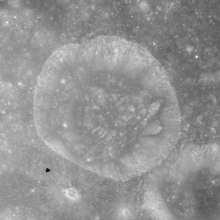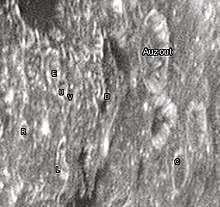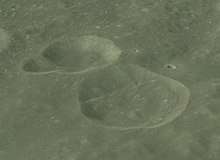Auzout (crater)
Auzout is a lunar impact crater that is located to the southeast of the Mare Crisium, near the eastern limb of the Moon. It is named after French astronomer Adrien Auzout."Auzout (crater)". Gazetteer of Planetary Nomenclature. USGS Astrogeology Research Program. Attached to the southern rim is the smaller crater van Albada. To the east-northeast is the large Condorcet. This crater is not especially notable, although it does possess a central mountain. This crater is designated 'Azout' in some sources.
 Apollo 15 image | |
| Coordinates | 10.21°N 64.01°E |
|---|---|
| Diameter | 33 km |
| Colongitude | 327° at sunrise |
| Eponym | Adrien Auzout |
Satellite craters

Auzout crater and its satellite craters taken from Earth in 2012 at the University of Hertfordshire's Bayfordbury Observatory with the telescopes Meade LX200 14" and Lumenera Skynyx 2-1
By convention these features are identified on lunar maps by placing the letter on the side of the crater midpoint that is closest to Auzout.

Oblique view of van Albada (upper left) and Auzout (lower right), from Apollo 17.
.png)
LRO image
| Auzout | Coordinates | Diameter, km |
|---|---|---|
| C | 8.79°N 65.27°E | 17 |
| D | 9.35°N 62.43°E | 12 |
| E | 9.57°N 60.66°E | 17 |
| L | 8.34°N 61.30°E | 8 |
| R | 8.70°N 60.04°E | 8 |
| U | 9.39°N 61.05°E | 8 |
| V | 9.34°N 61.31°E | 8 |
The following craters have been renamed by the IAU.
- Auzout A — See van Albada (crater).
- Auzout B — See Krogh (crater).
gollark: Fiiiine, I'm not utterly actually present within all channels.
gollark: I am present within all channels.
gollark: “If you're trying to stop me, I outnumber you 1 to 6.”
gollark: “Never trust an unstable asymptotic giant branch star. Stick with main sequences and dwarfs.”
gollark: Empirically false.
References
- Andersson, L. E.; Whitaker, E. A. (1982). NASA Catalogue of Lunar Nomenclature. NASA RP-1097.CS1 maint: ref=harv (link)
- Bussey, B.; Spudis, P. (2004). The Clementine Atlas of the Moon. New York: Cambridge University Press. ISBN 978-0-521-81528-4.CS1 maint: ref=harv (link)
- Cocks, Elijah E.; Cocks, Josiah C. (1995). Who's Who on the Moon: A Biographical Dictionary of Lunar Nomenclature. Tudor Publishers. ISBN 978-0-936389-27-1.CS1 maint: ref=harv (link)
- McDowell, Jonathan (July 15, 2007). "Lunar Nomenclature". Jonathan's Space Report. Retrieved 2007-10-24.CS1 maint: ref=harv (link)
- Menzel, D. H.; Minnaert, M.; Levin, B.; Dollfus, A.; Bell, B. (1971). "Report on Lunar Nomenclature by the Working Group of Commission 17 of the IAU". Space Science Reviews. 12 (2): 136–186. Bibcode:1971SSRv...12..136M. doi:10.1007/BF00171763.CS1 maint: ref=harv (link)
- Moore, Patrick (2001). On the Moon. Sterling Publishing Co. ISBN 978-0-304-35469-6.CS1 maint: ref=harv (link)
- Price, Fred W. (1988). The Moon Observer's Handbook. Cambridge University Press. ISBN 978-0-521-33500-3.CS1 maint: ref=harv (link)
- Rükl, Antonín (1990). Atlas of the Moon. Kalmbach Books. ISBN 978-0-913135-17-4.CS1 maint: ref=harv (link)
- Webb, Rev. T. W. (1962). Celestial Objects for Common Telescopes (6th revised ed.). Dover. ISBN 978-0-486-20917-3.CS1 maint: ref=harv (link)
- Whitaker, Ewen A. (2003). Mapping and Naming the Moon. Cambridge University Press. ISBN 978-0-521-54414-6.CS1 maint: ref=harv (link)
- Wlasuk, Peter T. (2000). Observing the Moon. Springer. ISBN 978-1-85233-193-1.CS1 maint: ref=harv (link)
External links
- LTO-62B4 Auzout — L&PI topographic map
| Wikimedia Commons has media related to Auzout (crater). |
This article is issued from Wikipedia. The text is licensed under Creative Commons - Attribution - Sharealike. Additional terms may apply for the media files.
